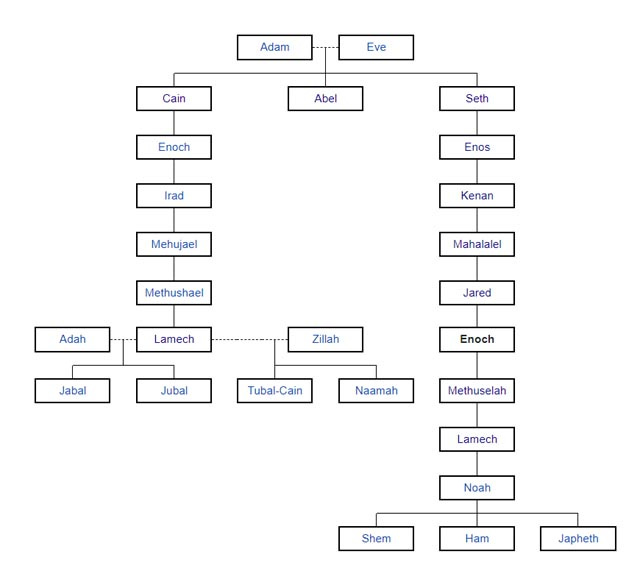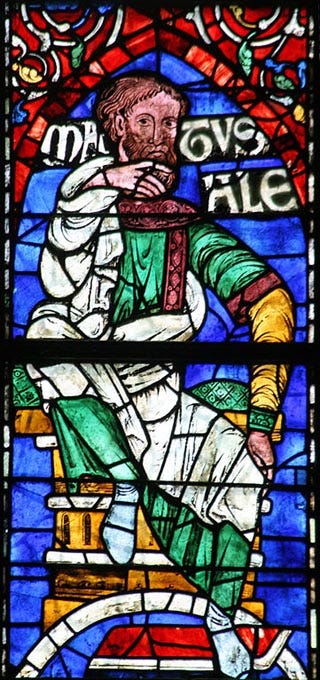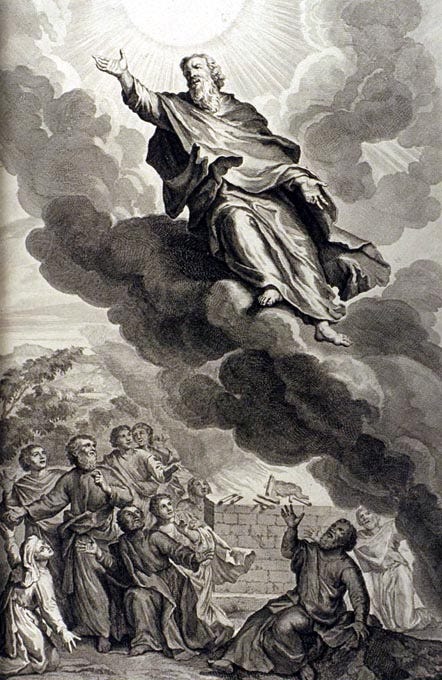What we call the fifth chapter of Genesis calls itself "the book of the generations of Adam." We might paraphrase this as "the people generated by Adam" (all male, incidentally). In other words, this is Adam's family tree.
Biblical genealogies are notoriously dry, boring, and skippable. We will certainly be skipping over some in the future, but I thought we'd zoom in on this one a little just to get a "feel" for it, and for genealogies in general.

Adam and Eve's (and therefore our?) family tree, a screenshot from Wikipedia.
The Pattern
The first thing we notice is that the first nine of the ten items on this list fall into a pattern, like this:
So-and-so fathered [someone] at [a particular age];
and then he lived another [number of years] and had more children;
he lived [a total of the two numbers] and then died.
From this we get mainly two facts: the name of So-and-so's heir, and how long So-and-so lived. More interesting than these dry facts are the variations in the pattern found in certain items; we'll get to these in a minute. But first: nine hundred years?
Stupendous Longevity

Stained glass window of Methuselah from the southwest transept of Canterbury Cathedral in Kent, England (Wikipedia)
Here are the ages of Adam and his descendants, as listed in this chapter:
Adam 930 years
Seth 912 years
Enos 905 years
Cainan (or Kenan) 910 years
Mahalaleel 895 years
Jared 962 years
Enoch 365 years
Methuselah 969 years
Lamech 777 years
Noah 950 years (as we find out later)
(By the way, these are some of the numbers that Bishop Ussher crunched in determining that the world was created in 4004 BCE. How he got 6 pm on October 22 is anyone's guess. The Jews, using some of the same texts, place Adam's creation at 3760/1 BCE; this year, 2019/20, is the year 5780, and will change in September at Rosh Hashanah, the "Jewish New Year.")
That anyone could live to such extreme ages is pretty unlikely, you say? Not to worry. The True Believers have an explanation for this. Or two. or three.
You see, Sin had not yet gotten its hooks into our primordial ancestors. By some unexplained process, Sin shortens lives. (So why do we say "Only the good die young"?) That "ye shall surely die" thing in Eden was implemented incrementally, or something. Anyway, we'll see a rapid decline in age from Noah to Abraham; odd, that, since the Flood was supposed to cleanse the earth of sin.
Another theory is that the UV rays of the sun hadn't yet had a chance to corrupt our DNA, or something, because before the Flood the earth was covered by a fog, or something.
Or maybe its like Xerox photocopies; the farther from the original, the worse the copy.
Anyway, I've also been told, is it really so outrageous to think that people could live nearly a thousand years? I mean, you won't believe what those ridiculous pagans wrote down! For example, the Sumerian King List gives reigns (not life spans, mind you, but only reigns) of as many as 43,200 years! The first eight kings in the list reigned: 28,800, 36,000, 43,200, 28,800, 36,000, 28,800, 21,000, and 18,600 years, in that order.
Nine-hundred and sixty-nine doesn't seem so ridiculous now, now does it?
The best conservative scholars (IMO) simply face up to the fact that these "antediluvian patriarchs" lived a long time and tell us to just deal with it.
There are also some fairly rational explanations for all this. One is that the Hebrew scribes, known for their accuracy, somehow accidentally wrote "years" instead of "months"--dozens of times. So Methuselah lived 969 months, a more-manageable 78-years-plus. But that means Mahalaleel begat Jared (and Enoch begat Methuselah) at 62 months, or a little over five years old? That's messed up.
Another scholar pulls out of his--imagination--the idea that a later editor just multiplied everything by ten. That leaves us with the same problem: some of the patriarchs fathered kids at 6.2 years old.
Here's another beauty of a suggestion: We don't have a complete list here; there are gaps between these guys. Nope. The text clearly says A begat B who begat C and so on, and A lived X number of years, "and then he died." No way to stick other people into such a tight linguistic structure, even if some say "begat" might apply generations later (my great-grandfather begat me? Nah.).
What we're seeing here is a trans-cultural phenomenon: the idea that the heroes of old, the doers of out-sized deeds, also lived out-sized lives. Bhishma, a strongman in the Indian epic Mahabharata lived about five generations. The holy figures of the Jains (called Tirthankaras) could live as many as 8,400,000 purvas; since one purva was 70,560,000,000,000 years, that's <counting on fingers> a danged long time. But by the time of the 24th and last, Mahavira (a contemporary of the Buddha, and the only Tirthankara known to history), we were down to a perfectly normal 72 years. Peng Zu, the "Chinese Methuselah," lived over 800 years, having been left off of the death list in heaven. This was back in the Shang dynasty, which is on the borders of history, as the predecessor dynasty, the Xia, is considered to be semi-mythical.
And so it goes.
PS I did the math--well, actually, I made a timeline. When Adam died at 130, all of his successors had been born except Noah. (Counting Adam's birth as "0," Adam died in 930 and Noah was born in 1054.) No one died before Adam; even Enoch's translation was 55 years after Adam died. That means that, from 872 to 930--a period of 58 years--the first nine patriarchs were all alive, and Adam knew his great-great-great-great-great-great-grandson, until the latter was almost 60! And, since everyone in between was also still alive, just imagine Thanksgiving dinner at their house!
PPS Methuselah, Noah's grandpa, was the only one still alive at the time of the Flood, and his death in 1654 on my timeline is the same year as the Flood on my timeline, so, way to go, Noah. Didn't even save your own granddad.
Rectifying Some Names
Astute exegetes will note that two names on this list--Enoch and Lamech--coincide with two in Chapter 4. These are not the same guys. Just remember, the guys in Chapter 4 descended from Cain (boo, hiss); these from Seth (hurrah!). Lamech of Cain is a scoundrel; Seth's Lamech is a good guy. I guess there were only so many names to go around, so it's not surprising that cousins would share monikers.
It's also a little suspicious that in Cain's genealogy Lamech's father is named Methusael, when the father of this Lamech is almost an anagram for that: Methuselah. This is one reason some think there was more than just a little cross-referencing going on, like the two list-makers were working from the same source material. See also Cain/Cainan and Mehujael/Mahalaleel.
Zooming In

God "took" Enoch; illustration from the 1728 Figures de la Bible; illustrated by Gerard Hoet (Wikipedia)
Although there is an obvious pattern in the descriptions of each man (perhaps reflecting an oral tradition, which thrives on repetition), there are glaring differences as well. A look at these can be instructive.
--------
5:1-5 Adam
We've already discussed the first father to death (literally). But let's note that, in lieu of naming his father, the writer(s) take the time to tell us where Adam came from by recapping Genesis 2 and 3: the god "made him in the likeness of God," "created them male and female," and so on.
--------
5:21-24 Enoch
There are a couple of peculiarities here. First, his life is nearly two-thirds shorter than most of the others, just 365 years.
365. Hmmm... The exact number of days in a year?
Then, whereas all the others "died," the text says "Enoch walked with God: and he was not; for God took him."
What are we to make of this? "Walked with God" might mean he lived a holy life, which led to his being "taken." Others think this was more literal: he "walked with God" after he was taken--that is, he was in heaven. But sine Noah also "walked with God" in the next chapter, let's go with the more mundane understanding: Enoch was a holy guy.
The New Testament Epistle to the Hebrews glosses this whole affair thus: "Enoch was translated that he should not see death; and was not found, because God had translated him: for before his translation he had this testimony: that he pleased God." The Greek word translated "translated" (see what I did there?) can mean literally "transported," though it might also mean "changed" or "transferred" (to another place).
The general feeling is that Enoch was lifted straight up into heaven, whence (according to tradition) he made prophecies, some of them recorded in the extra-Biblical Book of Enoch, along with the origins of demons and giants, some stuff about angels, and so on. Heady.
Combine the 365 factoid with the lifted-into-Heaven factoid, along with his later alleged ability to see all of time--looking back to the past and forward to the future--and this starts to feel like we may be dealing with a vestige of some kind of solar myth. Or not. He should be showing up as a character in some sort of computer game or something, shouldn't he?
--------
5:25-27 Methuselah
As the oldest on the list, his name has become proverbial: "That guy's as old as Methusaleh," etc. So well-known is he that Ira Gershwin used him in the lyrics to the song "It Ain't Necessarily So" from Porgy and Bess:
Methuselah lived nine hundred years.
Methuselah lived nine hundred years.
But who calls that livin'
When no gal will give in
To no man what's nine hundred years?
--------
5:28-31 Lamech
Lamech, as the father of Noah, one of the Stars of the Show, gets special treatment in the list--kind of like the way we know the name of Michael Jackson's dad--telling us how he came up with Noah's name (where none of the others' names are explained). The folk etymology says it means "comfort," so Lamech says, "This same shall comfort us concerning our work and toil of our hands" and so on.
--------
5:32 Noah
Noah and his sons (Shem, Ham, and Japheth) will be dealt with fully in future lessons, so let's leave them alone here.
The Text
Most of what I wanted to say has been said, so there won't be any Footnotes. Let me just comment that "begat" is the past tense of "beget"; the past participle is "begotten." "Beget" is an archaic reference to generating offspring; when the mother is mentioned, we can say (though I wish we wouldn't) "Jacob begat on Leah..." Nicer would be "Jacob begat by Leah," but that sounds too much like race horses. I have chosen the more modern (and less vulgar-sounding) "fathered" to replace "begat."
Rather than using separate titles, I have simply put the protagonist of each section in bold type.
5:1 This is the book of the generations of Adam. In the day that God created man, he made him in the likeness of God;
5:2 He created them male and female; and blessed them, and called their name Adam, in the day when they were created.
5:3 And Adam lived a hundred and thirty years, and fathered a son in his own likeness, after his image; and called his name Seth:
5:4 And the days of Adam after he had fathered Seth were eight hundred years: and [Adam] fathered [other] sons and daughters:
5:5 And all the days that Adam lived were nine hundred and thirty years: and he died.
5:2 called their name Adam: Okay, just one footnote. The plural here is where we get the idea that Adam means "humankind," and not just "a man." See the Footnote to Genesis 2:23.
--------
5:6 And Seth lived a hundred and five years, and fathered Enos:
5:7 And Seth lived after he fathered Enos eight hundred and seven years, and fathered [other] sons and daughters:
5:8 And all the days of Seth were nine hundred and twelve years: and he died.
--------
5:9 And Enos lived ninety years, and fathered Cainan (or Kenan):
5:10 And Enos lived after he fathered Cainan eight hundred and fifteen years, and fathered [other] sons and daughters:
5:11 And all the days of Enos were nine hundred and five years: and he died.
--------
5:12 And Cainan lived seventy years, and fathered Mahalaleel:
5:13 And Cainan lived after he fathered Mahalaleel eight hundred and forty years, and fathered [other] sons and daughters:
5:14 And all the days of Cainan were nine hundred and ten years: and he died.
--------
5:15 And Mahalaleel lived sixty and five years, and fathered Jared:
5:16 And Mahalaleel lived after he fathered Jared eight hundred and thirty years, and fathered [other] sons and daughters:
5:17 And all the days of Mahalaleel were eight hundred ninety and five years: and he died.
--------
5:18 And Jared lived a hundred sixty and two years, and he fathered Enoch:
5:19 And Jared lived after he fathered Enoch eight hundred years, and fathered [other] sons and daughters:
5:20 And all the days of Jared were nine hundred sixty and two years: and he died.
--------
5:21 And Enoch lived sixty and five years, and fathered Methuselah:
5:22 And Enoch walked with God after he fathered Methuselah three hundred years, and fathered [other] sons and daughters:
5:23 And all the days of Enoch were three hundred sixty and five years:
5:24 And Enoch walked with God: and he was not; for God took him.
--------
5:25 And Methuselah lived a hundred eighty and seven years, and fathered Lamech:
5:26 And Methuselah lived after he fathered Lamech seven hundred eighty and two years, and fathered [other] sons and daughters:
5:27 And all the days of Methuselah were nine hundred sixty and nine years: and he died.
--------
5:28 And Lamech lived a hundred eighty and two years, and fathered a son:
5:29 And he called his name Noah, saying, "This same shall comfort us concerning our work and toil of our hands, because of the ground which the LORD hath cursed."
5:30 And Lamech lived after he fathered Noah five hundred ninety and five years, and fathered [other] sons and daughters:
5:31 And all the days of Lamech were seven hundred seventy and seven years: and he died.
--------
5:32 And Noah was five hundred years old: and Noah fathered Shem, Ham, and Japheth.
--------
Well, there ya have it. Next time we'll get ready to dive in (heh heh) to Noah's Flood, in Genesis 6: Before the Great Flood.
'Til soon!



James: Good take on this, but another interesting angle is the order and meanings of the names in Genesis 5. See this link: https://khouse.org/articles/2000/284/